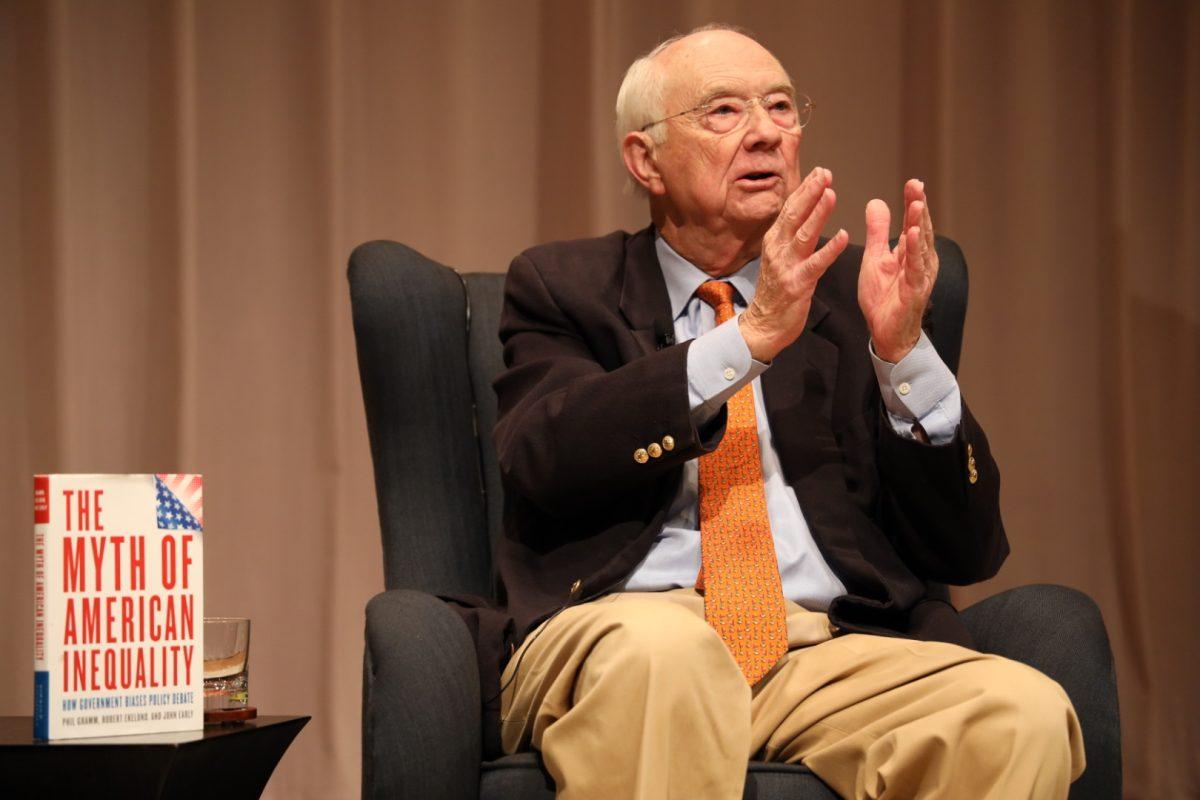Texas Sen. Phil Gramm returned to Aggieland to discuss how his book exposes the misconceptions of poverty due to alleged faulty Census Bureau statistics.
On the evening of Feb. 8, attendees gathered at the Annenberg Presidential Conference Center for Gramm’s live discussion of his book, “The Myth of American Inequality: How Government Biases Policy Debate,” co-authored by economist Robert Ekelund and mathematical economist John Early. The event was sponsored by the Department of Political Science, Texas A&M Private Enterprise Research Center and the 451 NOW podcast. Its agenda included an interview with Gramm and A&M student senator and 451 NOW host Ben Crockett, concluding with an open-mic Q&A period with the audience and book signing.
Nearly 500 people registered to attend for free, with many students and community members in attendance following an event preview published by The Eagle.
“Everything you know about income inequality, poverty and other measures of economic well-being in America is wrong,” the publisher’s book description reads.
Originally published in Sept. 2022, the joint-effort book details and examines American poverty and income inequality and includes authors from different political backgrounds.
Gramm had an extensive career in academia, public service and the private sector. In 1967, Gramm began his career as an economics professor at A&M and taught for 12 years before pursuing a career in Congress for 23 years, serving as a Texas senator and a member of the House of Representatives.
“The book is really an effort to take a close look at how we measure income and poverty and inequality,” Gramm said.
Gramm spoke extensively about his suspected inaccuracies of American measures used to create statistics for identifying poverty rates and the need for government transfers, also known as public assistance benefits.
Gramm said he was inspired to write the book two years ago during the COVID-19 pandemic, and, with his newfound time and the help of his co-authors, worked to tell the closest they could get to the truth.
“In 1947, the Census [Bureau] started out counting only cash payments as income,” Gramm said. “It produced an estimate that was about 97% accurate. The problem is when the ‘War on Poverty’ came in 1965, virtually every poverty program was paid-in-kind.”
Paid-in-kind refers to government transfers that give recipients access to services or goods instead of cash payments. For example, the government may pay for citizens’ healthcare instead of directly giving recipients the money; food programs like Supplemental Nutrition Assistance Program, or SNAP, may give citizens a pre-loaded debit card to pay for groceries.
During his initial interview, Gramm discussed the brief history and significance of government transfers, which include expenditures the U.S. makes to provide assistance to low-income, disabled or retired citizens. Such expenditures provide citizens with access to health insurance, income assistance, housing aid and food programs. For example, programs include: Medicaid, SNAP, Supplemental Security Income, housing assistance, earned income tax credits and more.
Gramm presented statistics on how recipients use government transfers, stating the bottom 20% of users spent or consumed twice as much as their reported income. Gramm also said two-thirds of all transfer payments made to citizens are not counted as forms of income.
Gramm said the current methodology for creating census statistics improperly reflects the US’ poverty rate, which is based on counting the earned income of citizens. According to Gramm, if received public assistance and benefits’ monetary worth were included in recipients’ income, the actual poverty rate would be around 2-3% as opposed to the current 12% rate.
“You all have heard income inequality is the greatest problem in America, and it’s growing,” Gramm said.
The growing inequality of income distribution is seen as obscene and unsustainable, Gramm said.
“We found that if you count transfer payments as forms of income to people who receive it, and all taxes as income loss to people who pay the taxes, that income inequality is actually lower today than it was in 1947,” Gramm said.
Gramm said welfare programs are not helping the people who are actually poor due to “wants and needs” being replaced with idleness when citizens are incentivized to not work. Citing statistics about economic mobility in the U.S., Gramm stated it’s hard to help people without destroying their incentive to help themselves by working, posing a threat of losing their benefits.
The senator stated politicians should debate things other than giving people more money and should ask if these programs are worth the cost.
Additionally, Gramm acknowledged the quality of education in the U.S. needs improvement, stating his concern that people from marginalized groups are taught they don’t have a chance to succeed.
As the interview concluded to continue with the audience’s Q&A, Gramm gave the audience a piece of advice that his mother told him while growing up.
“You can be who you want to be, but you have to be willing to pay the price,” Gramm said.





















